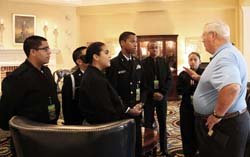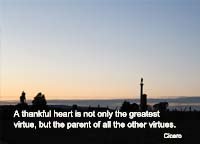Four Days of Honor and Valor in Gettysburg: Lessons Learned on the Journey
Written by Tony Mussari, Sr.
Edited by Kitch Loftus-Mussari
Photographs by Katie Hennessey and Bill Gaydos
During our 15 month journey from the dream to the reality of Four Days of Honor and Valor in Gettysburg,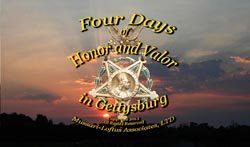 Kitch and I had several experiences that reinforced lessons we were taught at the kitchen table by our parents.
Kitch and I had several experiences that reinforced lessons we were taught at the kitchen table by our parents.
These are a few of those lessons.
When I was a youngster, my mother used aphorisms to reinforce the values she wanted us to learn and practice. One of the most powerful aphorisms had five words:
Actions speak louder than words.
Thinking about the moments we spent with Medal of Honor 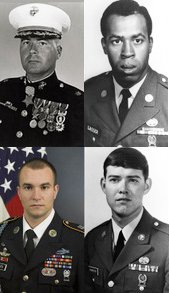 recipients Barney Barnum, Sal Guinta, Charles Hagemeister, Clarence Sasser and Brian Thacker, the words of my mother’s favorite maxim were reinforced. These men are defined by their actions, not their words.
recipients Barney Barnum, Sal Guinta, Charles Hagemeister, Clarence Sasser and Brian Thacker, the words of my mother’s favorite maxim were reinforced. These men are defined by their actions, not their words.
During the most dangerous moments of their lives, they faced their fears and they followed their instincts to help their comrades and vanquish their opponents. They acted without regard for self. They acted in ways they knew would put themselves in danger. They accepted the danger and the inconvenience of the moment, because they had a higher purpose than convenience. They were on a mission to help others. They were motivated by service not reward.
Hard work never hurt anyone.
Over and over again, we heard those words from our parents, and we witnessed their willingness to work hard so we would always have food on the table and coal in the stove for heat.
My brother, sister and I were expected to work for the things we wanted. The same was the case in Kitch’s home. It wasn’t called sweat equity. We were taught that we had a responsibility to pull our fair share of the load.
The Medal of Honor recipients personify the same work ethic. They worked hard during combat. They are working hard to this day to preserve the legacy of their “boys” as one of them told us, and to help others learn and apply the values associated with the Medal of Honor.
You make your bed and you lay in it.
This aphorism taught us all we needed to know about making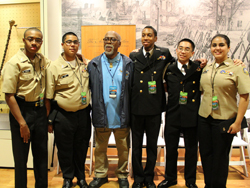 choices and being responsible for the choices we make. We were not permitted to blame others for our troubles. Excuses for bad behavior were not accepted. I can vividly recall my parents telling me if you get in trouble in school, you will be in big trouble at home.
choices and being responsible for the choices we make. We were not permitted to blame others for our troubles. Excuses for bad behavior were not accepted. I can vividly recall my parents telling me if you get in trouble in school, you will be in big trouble at home.
One of the most compelling moments at the Medal of Honor Convention happened during an interview with Medal of Honor recipient Clarence Sasser when he challenged everyone in our group to make good choices that only we are responsible for. As he was saying those words, Kitch and I were hearing our parents encouraging us to do the very same thing. The only difference was the nine words they used.
Tell me who your company is and I will tell you who you are.
When we were growing up, popularity was the measure of success. Our parents worried about the people we chose as our friends. They wanted us to associate with people who would bring us up, people who were interested in learning, people who wanted to make something of their lives, and people who did not take shortcuts.
When Medal of Honor recipient Charles Hagemeister talked with the students from North Plainfield he urged them to do the same thing. Your generation needs heroes, people who do the right thing for the right reason. Then he explained the importance of humility in leading a quality life:
As we wear this medal, and we’re honored to do that, while this is engraved on the back that this is mine, there were a lot of people who did actions that were equal to and were greater than mine that don’t get to wear this…and all of us wear this for those people.
Charles Hagemeister was 21 years old when with “total disregard for his safety he raced through the deadly hail of enemy fire to provide medical aid and he continued to brave the withering enemy fire and crawled forward to render lifesaving treatment and to offer words of encouragement to wounded comrades.”
All of us would be fortunate to have a friend like Charles Hagemeister.
A quitter never wins and a winner never quits.
Many times during this journey, we encountered bumps in the road we never expected. They tested our determination, our resilience and our ability to concentrate. There is no need to mention the specifics here, the lesson, however should be obvious. We refused to give up.
Whenever we needed encouragement and strength, we turned to the words of the people we met during our journey. We drew strength from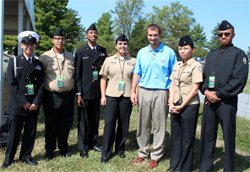 the inspirational example of the Medal of Honor recipients and their stories.
the inspirational example of the Medal of Honor recipients and their stories.
Sal Guinta’s words helped us to stay focused:
It doesn’t matter how many times you get knocked down as long as you get up one more time…that means you are standing on your feet and moving forward.
It’s never over until you quit trying.
These are powerful words of encouragement all of us need to survive the unexpected challenges of life.
Be thankful for what you have.
These six words were an essential part of Kitch’s childhood and mine as well. We did not have many luxuries in our homes, but we were always encouraged to be thankful for what we had.
For us gratitude is the spark that lights the candle of happiness. The four days we spent with the Medal of Honor recipients reinforced the power of gratitude. Every one of these heroes are grateful for the blessings of liberty, the opportunities afforded by birth in America, and their responsibility to maintain the legacy of the values represented in the
medal they wear.
These values are universal in nature, and they can and must be applied in every aspect of our daily life.
In a very real way, our journey to produce this documentary took us back to our roots, and that has been the most powerful lesson we learned. Our parents were genuine heroes. They taught us by example what America is on its best day because like the Medal of Honor recipients they are a part of the mosaic of the Face of America on its best day, and we are in their debt.
Please provide feedback to:
